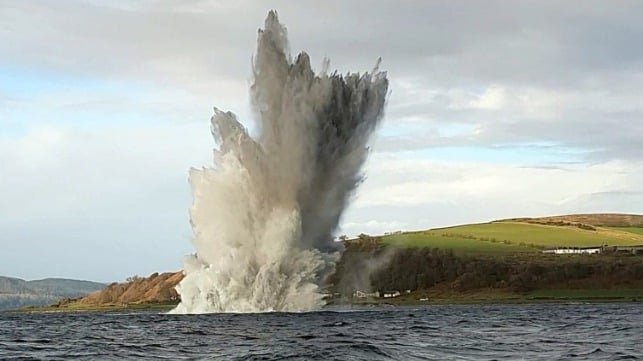UK Tells Offshore Developers "Make Less Noise" During Bomb Disposal

The UK government is telling the developers of offshore sites including wind farms to adopt new tactics to ”reduce harmful noise” as they continue to build the projects. During surveys and development, they often encounter unexploded shells and bombs left over from the two World Wars that need to be disposed of as well as construction steps such as pile driving which creates underwater noise.
The government reports that there are over 300,000 pieces of unexploded ordnance from the First and Second World Wars that sit on the UK seabed. A 2020 report to Parliament estimated the number as high as 500,000 pieces. If encountered, it must be cleared during the construction of projects including offshore wind farms.
Just over a week ago, Shell reported it had discovered about 40 miles to the east of Shetland an unexploded bomb next to one of its gas lines running across the North Sea. In 2023, more than 70 unexploded ordnance were discovered during surveys in the Scottish North Sea for Ocean Winds’ planned Moray West project.
“For too long we’ve been using Second World War technology to dispose of underwater unexploded munitions,” said Dame Joanna Lumley, a British actress and activist. For the past few years, she has been leading the campaign Stop Sea Blasts.
The new provisions are part of the UK Government’s Plan for Change launched in December 2024 by the government of Prime Minister Sir Keir Starmer. It focuses on the transition to renewable energy and revitalizing British industry. While setting ambitious goals to fast-track the delivery of clean power systems by 2030, the policy includes steps that call for reducing harmful noise levels in the seas.
Operators are expected to use low-noise disposal methods to clear ordnance by default, with noisy high-order detonations considered a last resort and restricted to extraordinary circumstances only. Developers will also now be required to demonstrate they have made clear efforts to reduce underwater noise during the installation of offshore wind turbines. This will be followed by a public consultation on setting a future noise limit for offshore wind construction.
“These new measures support the construction of offshore wind that the UK needs, while making sensible changes to stop needless harm to underwater life,” said Marine Minister Emma Hardy. “As we expand offshore wind to make Britain a clean energy superpower through our Plan for Change, we need to protect the vulnerable animals of our seas.”
The government highlights that it has partnered with The Crown Estate’s Offshore Wind Evidence and Change program and representatives from the explosives and offshore wind industries to test and develop new, quieter technologies for bomb clearance, and pilot proposed noise limits during offshore wind construction.
By defining the policies, the government asserts that it will make the construction process simpler and ensure that future projects can be built at pace. The measures it reports will prevent construction delays caused by breaches in noise thresholds.
